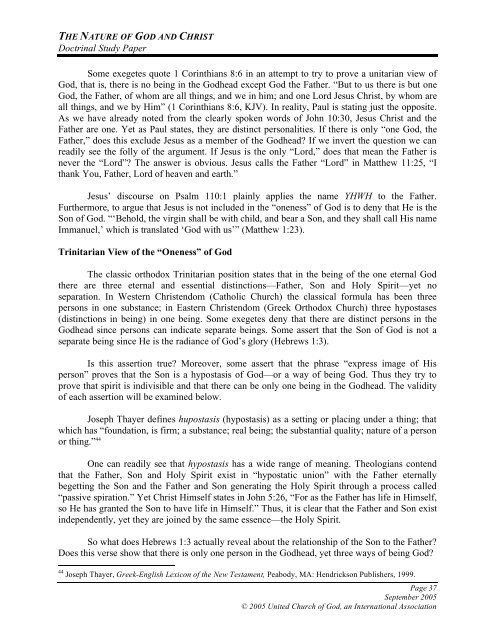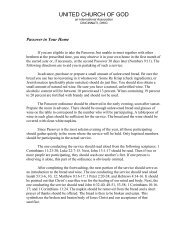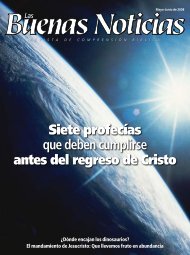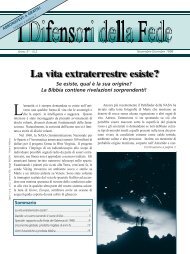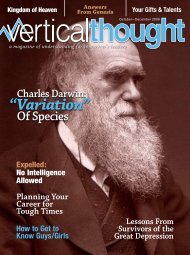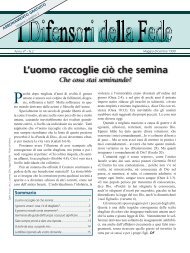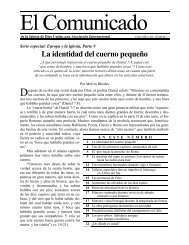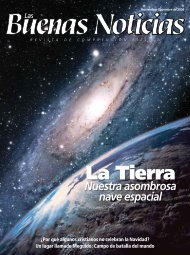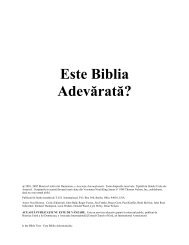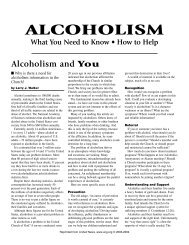The Nature of God and Christ - Members Site - United Church of God
The Nature of God and Christ - Members Site - United Church of God
The Nature of God and Christ - Members Site - United Church of God
- No tags were found...
You also want an ePaper? Increase the reach of your titles
YUMPU automatically turns print PDFs into web optimized ePapers that Google loves.
THE NATURE OF GOD AND CHRISTDoctrinal Study PaperSome exegetes quote 1 Corinthians 8:6 in an attempt to try to prove a unitarian view <strong>of</strong><strong>God</strong>, that is, there is no being in the <strong>God</strong>head except <strong>God</strong> the Father. “But to us there is but one<strong>God</strong>, the Father, <strong>of</strong> whom are all things, <strong>and</strong> we in him; <strong>and</strong> one Lord Jesus <strong>Christ</strong>, by whom areall things, <strong>and</strong> we by Him” (1 Corinthians 8:6, KJV). In reality, Paul is stating just the opposite.As we have already noted from the clearly spoken words <strong>of</strong> John 10:30, Jesus <strong>Christ</strong> <strong>and</strong> theFather are one. Yet as Paul states, they are distinct personalities. If there is only “one <strong>God</strong>, theFather,” does this exclude Jesus as a member <strong>of</strong> the <strong>God</strong>head? If we invert the question we canreadily see the folly <strong>of</strong> the argument. If Jesus is the only “Lord,” does that mean the Father isnever the “Lord”? <strong>The</strong> answer is obvious. Jesus calls the Father “Lord” in Matthew 11:25, “Ithank You, Father, Lord <strong>of</strong> heaven <strong>and</strong> earth.”Jesus’ discourse on Psalm 110:1 plainly applies the name YHWH to the Father.Furthermore, to argue that Jesus is not included in the “oneness” <strong>of</strong> <strong>God</strong> is to deny that He is theSon <strong>of</strong> <strong>God</strong>. “‘Behold, the virgin shall be with child, <strong>and</strong> bear a Son, <strong>and</strong> they shall call His nameImmanuel,’ which is translated ‘<strong>God</strong> with us’” (Matthew 1:23).Trinitarian View <strong>of</strong> the “Oneness” <strong>of</strong> <strong>God</strong><strong>The</strong> classic orthodox Trinitarian position states that in the being <strong>of</strong> the one eternal <strong>God</strong>there are three eternal <strong>and</strong> essential distinctions—Father, Son <strong>and</strong> Holy Spirit—yet noseparation. In Western <strong>Christ</strong>endom (Catholic <strong>Church</strong>) the classical formula has been threepersons in one substance; in Eastern <strong>Christ</strong>endom (Greek Orthodox <strong>Church</strong>) three hypostases(distinctions in being) in one being. Some exegetes deny that there are distinct persons in the<strong>God</strong>head since persons can indicate separate beings. Some assert that the Son <strong>of</strong> <strong>God</strong> is not aseparate being since He is the radiance <strong>of</strong> <strong>God</strong>’s glory (Hebrews 1:3).Is this assertion true? Moreover, some assert that the phrase “express image <strong>of</strong> Hisperson” proves that the Son is a hypostasis <strong>of</strong> <strong>God</strong>—or a way <strong>of</strong> being <strong>God</strong>. Thus they try toprove that spirit is indivisible <strong>and</strong> that there can be only one being in the <strong>God</strong>head. <strong>The</strong> validity<strong>of</strong> each assertion will be examined below.Joseph Thayer defines hupostasis (hypostasis) as a setting or placing under a thing; thatwhich has “foundation, is firm; a substance; real being; the substantial quality; nature <strong>of</strong> a personor thing.” 44One can readily see that hypostasis has a wide range <strong>of</strong> meaning. <strong>The</strong>ologians contendthat the Father, Son <strong>and</strong> Holy Spirit exist in “hypostatic union” with the Father eternallybegetting the Son <strong>and</strong> the Father <strong>and</strong> Son generating the Holy Spirit through a process called“passive spiration.” Yet <strong>Christ</strong> Himself states in John 5:26, “For as the Father has life in Himself,so He has granted the Son to have life in Himself.” Thus, it is clear that the Father <strong>and</strong> Son existindependently, yet they are joined by the same essence—the Holy Spirit.So what does Hebrews 1:3 actually reveal about the relationship <strong>of</strong> the Son to the Father?Does this verse show that there is only one person in the <strong>God</strong>head, yet three ways <strong>of</strong> being <strong>God</strong>?44 Joseph Thayer, Greek-English Lexicon <strong>of</strong> the New Testament, Peabody, MA: Hendrickson Publishers, 1999.Page 37September 2005© 2005 <strong>United</strong> <strong>Church</strong> <strong>of</strong> <strong>God</strong>, an International Association


